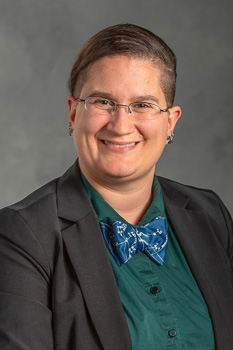Ariel Cascio

Assistant Professor
Center for Bioethics and Social Justice
Department of Medicine
- A-135 East Fee Hall
- (517) 353-9523
- casciome@msu.edu
- Pronouns: they/she
- PhD 2015 Case Western Reserve University
Research
Ariel Cascio is an anthropologist and assistant professor in the Center for Bioethics and Social Justice. They undertook training in neuroethics and pragmatic health ethics at the Institut de recherches cliniques de Montréal. Their research focuses on social and ethical issues around autism, cognitive difference and disability, and neurodiversity in Europe and North America, with a particular focus on Italy. Dr. Cascio’s research projects largely center around the questions “what does autism mean?” and “how do groups account for the neurological diversity of their members?” They also conduct research in medical education and uncertainty in medicine and support student endeavors in the medical humanities. This research has been funded, in part, by the U.S.-Italy Binational Fulbright Commission, the Social Sciences and Humanities Research Council of Canada Banting Postdoctoral Fellowship Program, and the Wenner-Gren Foundation for Anthropological Research.
Selected Publications
Knopes, J. and A. Cascio. 2022. Beyond Competence: Efficiency in American Biomedicine. Culture, Medicine, & Psychiatry. Epub ahead of print: https://doi.org/10.1007/s11013-022-09806-0.
Cascio, M.A. and E. Racine. 2022. Do different kinds of minds need different kinds of services? Qualitative results from a mixed-method survey of service preferences of autistic adults and parents. Neuroethics 15(13): unpaginated. https://doi.org/10.1007/s12152-022-09487-x.
Aspler, J., K.D. Harding, and M.A. Cascio. 2022. Representation Matters: Race, Gender, Class, and Intersectional Representations of Autistic and Disabled Characters on Television. Studies in Social Justice 16(2):323-348. https://doi.org/10.26522/ssj.v16i2.2702.
Scavarda, A. and M.A. Cascio. 2022. Embracing and rejecting the medicalization of autism in Italy. Social Science & Medicine 294:114728. https://doi.org/10.1016/j.socscimed.2022.114728.
Cascio, M.A. and E. Racine. 2022. Autism service preferences of parents and autistic adults in five countries. Autism Research 15(3):570-585. https://doi.org/10.1002/aur.2667.
Cascio, M.A., J. Weiss, and E. Racine. 2021. Making autism research inclusive by attending to intersectionality: A review of the research ethics literature. Review Journal of Autism and Developmental Disorders 8(1):22-36. DOI: 10.1007/s40489-020-00204-z.
Cascio, M.A. 2021. “Asperger’s Syndrome Does Not Exist”: The Limits of Brain-Based Identity Discourses around Asperger’s Syndrome and Autism in Italy. BioSocieties 16:196-224. https://doi.org/10.1057/s41292-020-00191-8.
Cascio, M.A., J. Weiss, E. Racine, and the Autism Research Ethics Task Force. 2020. Person-oriented ethics for autism research: Creating best practices through engagement with autism and autistic communities. Autism 24(7):1676-1690. DOI: 10.1177/1362361320918763.
Cascio, M.A. and E. Racine. 2018. Person-Oriented Research Ethics: Integrating Relational and Everyday Ethics in Research. Accountability in Research 25(3):170-197.
Cascio, M.A. 2017. Operationalizing New Biopolitical Theory for Anthropological Inquiry. Anthropological Quarterly 90(1):193-224.
More Items on the Web
- Cascio, M.A. and E. Racine. 2019. Research Involving Participants with Cognitive Disability and Differences. Post at The Neuroethics Blog.
- Aspler, J. and M.A. Cascio. 2018. Neurodevelopmental Disability on TV: Neuroethics and Season 1 of ABC’s Speechless. Post at The Neuroethics Blog.
- Podcast appearance: Ethical Research Podcast Episode 8: Dr. Ariel Cascio on Conducting Research with Autistic People (Spotify)
- Interview with Autism Ontario: Ethics in Autism Research
